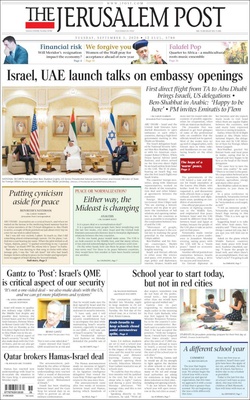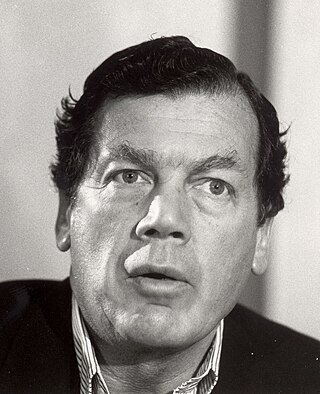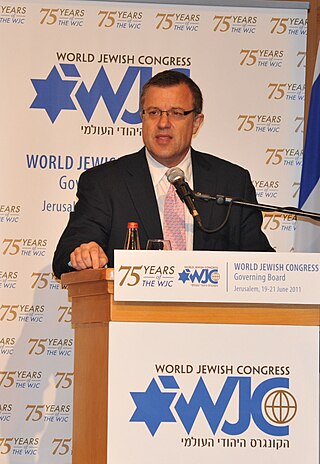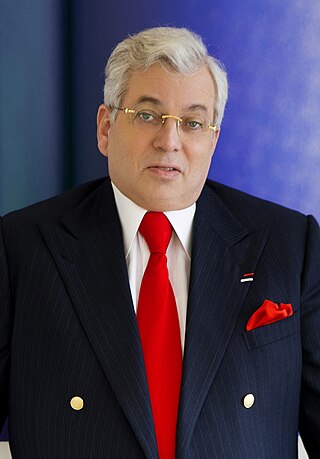Isi Leibler | |
|---|---|
 Isi Leibler, 2011 | |
| Born | 9 October 1934 |
| Died | 13 April 2021 (aged 86) |
Isi Leibler AO CBE (Hebrew: איזי ליבלר; 9 October 1934 [1] – 13 April 2021) [2] was a Belgian-born Australian-Israeli international Jewish activist.
Isi Leibler | |
|---|---|
 Isi Leibler, 2011 | |
| Born | 9 October 1934 |
| Died | 13 April 2021 (aged 86) |
Isi Leibler AO CBE (Hebrew: איזי ליבלר; 9 October 1934 [1] – 13 April 2021) [2] was a Belgian-born Australian-Israeli international Jewish activist.
Born in Antwerp, Belgium, Leibler was brought to Australia by his parents as an infant just before the outbreak of World War II. Leibler served as president of the Executive Council of Australian Jewry and Chairman of the Governing Board of the World Jewish Congress. He was a leader in the global campaign on behalf of Soviet Jewry and played a role in the lead-up to Israeli diplomatic relations between India and China.
Leibler and his wife moved to Israel in 1999, settling in Jerusalem. He wrote weekly columns in the Jerusalem Post, the Hebrew daily Israel Hayom, and on his blog Candidly Speaking from Jerusalem. [3]
Leibler married Naomi Porush in 1958, and the couple had three sons and a daughter. All of his children and most of their families also live in Israel.
Described in the new edition of Encyclopaedia Judaica as “unquestionably the dominant Jewish lay leader in Australia during the previous quarter century”, [4] Leibler occupied the leadership of the Australian Jewish community (Executive Council of Australian Jewry) from 1978 and served four terms in this office, retiring in 1995.
Leibler's involvement in the fight for Soviet Jewry was first solicited by Shaul Avigur, the head of Nativ (the then-covert agency dealing with Soviet Jews) who played an enormous role behind the scenes in the formulation of policy during the early years of the state. [5] In 1962, Mr. Leibler engineered a public campaign which resulted in Australia becoming the first country in the world to raise the plight of Soviet Jewry at the United Nations. In 1965, he published Soviet Jewry and Human Rights. [6]
Before the collapse of the Communist bloc, Leibler made numerous visits to the Soviet Union and developed close associations with the leading Jewish dissidents and refuseniks, which he still maintained in Israel. The visits came to an end in 1980 with his arrest and expulsion from the Soviet Union.
When Mikhail Gorbachev liberalised the system, Leibler became the first international Jewish leader to be invited to the Soviet Union to evaluate the changes. He subsequently launched the first Jewish cultural centre in the Soviet Union – the Solomon Mykhoels Centre in Moscow, [7] together with the first Hebrew Song Festivals in Moscow and Leningrad.
Leibler's activities and campaign on behalf of Soviet Jewry are documented in the book: Let my People Go: The untold story of Australia and Soviet Jews 1969 – 1989, authored by Sam Lipski and Suzanne Rutland in 2015. [8]
Following the liberation of Soviet Jewry, Leibler focused his attention on the Asia-Pacific region. He met with Indian Prime Minister Narasimha Rao and Chinese Foreign Minister Qian Qichen ahead of the establishment of diplomatic relations between Israel and both countries. Leibler also convened a colloquium for leading Jewish and Chinese scholars in Beijing prior to diplomatic relations being instituted between Israel and China.
Leibler occupied senior roles in the World Jewish Congress (WJC), an umbrella organisation representing global Jewry, including Chairman of the Governing Board and Senior Vice President.
In 2004, Leibler confronted the leadership of the WJC over the issue of governance, financial transparency, and financial irregularities. The conflict between Leibler and WJC Chairman Israel Singer revolved around the former's demand for an investigation into the transfer of $1.2 million from the organization's New York headquarters to a bank account in Geneva, and the subsequent transfer of the money by Singer into a trust account held by his friend. [9] Leibler's calls for a comprehensive independent audit" brought him into conflict with Singer and Edgar Bronfman, the WJC's longtime "president, chief benefactor, and guiding force." [10]
In January 2005, Leibler resigned as WJC vice president, telling Haaretz that he "came to the conclusion that I cannot remain in an organization that requires me to give a stamp of approval to activities I deem inappropriate. [11] Elan Steinberg also left the WJC amidst the controversy, while two other top officials were fired. [12] Leibler wrote that his position had been "vindicated" but expressed "deep sadness" at the organization's disarray. [13]
In 2004, the New York State Attorney General's Office began an investigation into the WJC. [14] The AG's Office issued a report in 2006 that found "serious financial mismanagement" at WJC, including improper payments and loans to Singer. [15] Under an agreement between the Attorney General's Office and WJC, Singer was barred from the organization's leadership roles and returned several loans and payments, and the WJC undertook reforms. [15] [16] The WJC subsequently filed a $6 million defamation suit against Leibler in the Israeli courts but withdrew the action less than six months later, and were ordered by the court to pay Leibler's legal expenses. [17] A PricewaterhouseCoopers audit in 2006 submitted by the WJC to the AG's Office found that the financial scandal was "significantly broader than has been publicly known," with some $3 million unaccounted for from 1994 to 2004. [18] Leibler, described by the Jewish Daily Forward as the "most persistent critic" of the WJC, said that these findings were not surprising. [18]
Leibler was accused of de-legitimizing liberal Jewish supporters of Israel. [19] Leibler responded that "I stand by my view that those whose primary goal is to delegitimize and demonize the Jewish state should be marginalized from the mainstream Jewish community. That is not fascism. It is common sense. [20]
Leibler called for a full external investigation and disclosure of massive misappropriations of funds at the Conference on Jewish Material Claims Against Germany (Claims Conference), citing allegations of incompetence, impropriety and cover-ups, the absence of an independent review board, bureaucratization and a domination by a small clique, along with a failure to "prioritize the needs of survivors, who are now elderly and many of whom are living in dire poverty. [21] In response Claims Conference Julius Berman has accused Leibler of engaging "in irresponsible invective and baseless charges against an organization that for nearly 60 years has been the leading international advocate for the rights of Holocaust victims." [22]
Leibler was a columnist for The Jerusalem Post. [23] He was also a regular columnist for Israel Hayom, the Israeli daily newspaper.
Leibler wrote on the dangers of religious extremism, in particular radical religious nationalism. [24] [25]
Leibler was the author of The Israel-Diaspora Identity Crisis: A Looming Disaster. [26]
He chaired the Israel Diaspora Committee of the Jerusalem Center for Public Affairs, an Israeli think tank. [27]
Leibler also published a study on the threat post-Zionism poses to the soul of Israel, titled Is the Dream Ending? [28]
In Australia, Leibler's company, Jetset Tours, was the largest travel organization in the region with branches throughout the world. He was also a director of one of Australia's three national television companies. In Israel, he had invested and acted as a consultant to a number of high tech companies.
Leibler was appointed a CBE (Commander of the Order of the British Empire) [29] in 1977, an AO (Officer of the Order of Australia) in 1989 and an honorary Doctor of Letters from Deakin University in 1990. In 2015, Leibler was awarded an honorary doctorate from Bar-Ilan University in recognition of “his tireless efforts to address the challenges facing the Jewish nation at every historic crossroad”. [30]

The Jerusalem Post is a broadsheet newspaper based in Jerusalem, founded in 1932 during the British Mandate of Palestine by Gershon Agron as The Palestine Post. In 1950, it changed its name to The Jerusalem Post. In 2004, the paper was bought by Mirkaei Tikshoret, a diversified Israeli media firm controlled by investor Eli Azur. The Jerusalem Post is published in English. Previously, it also had a French edition.

The World Jewish Congress (WJC) was founded in Geneva, Switzerland in August 1936 as an international federation of Jewish communities and organizations. According to its mission statement, the World Jewish Congress' main purpose is to act as "the diplomatic arm of the Jewish people". Membership in the WJC is open to all representative Jewish groups or communities, irrespective of the social, political or economic ideology of the community's host country. The World Jewish Congress headquarters are in New York City, and the organization maintains international offices in Brussels, Belgium; Jerusalem; Paris, France; Moscow, Russia; Buenos Aires, Argentina; and Geneva, Switzerland. The WJC has special consultative status with the United Nations Economic and Social Council.

Edgar Miles Bronfman was a Canadian-American businessman. He worked for his family's distilled beverage firm, Seagram, eventually becoming president, treasurer and CEO. As president of the World Jewish Congress, Bronfman is especially remembered for initiating diplomacy with the Soviet Union, which resulted in legitimizing the Hebrew language in the USSR, and contributed to Soviet Jews being legally able to practice their religion, as well as immigrate to Israel.

Aliyah is the immigration of Jews from the diaspora to, historically, the geographical Land of Israel or the Palestine region, which is today chiefly represented by the State of Israel. Traditionally described as "the act of going up", moving to the Land of Israel or "making aliyah" is one of the most basic tenets of Zionism. The opposite action — emigration by Jews from the Land of Israel — is referred to in the Hebrew language as yerida. The Law of Return that was passed by the Israeli parliament in 1950 gives all diaspora Jews, as well as their children and grandchildren, the right to relocate to Israel and acquire Israeli citizenship on the basis of connecting to their Jewish identity.

Natan Sharansky is an Israeli politician, human rights activist, and author. He served as Chairman of the Executive for the Jewish Agency from June 2009 to August 2018, and currently serves as Chairman for the Institute for the Study of Global Antisemitism and Policy (ISGAP), an American non-partisan organization. A former Soviet dissident, he spent nine years imprisoned as a refusenik during the 1970s and 1980s.

Shlomo Moshe Amar is the former Sephardic Chief Rabbi of Israel. He served in the position of Rishon LeZion from 2003 to 2013; his Ashkenazi counterpart during his tenure was Yona Metzger. In 2014 he became the Sephardic Chief Rabbi of Jerusalem.
The Conference on Jewish Material Claims Against Germany, or Claims Conference, represents the world's Jews in negotiating for compensation and restitution for victims of Nazi persecution and their heirs. According to Section 2(1)(3) of the Property Law of Germany, the Claims Conference is a legal successor with respect to the claims not filed on time by Jewish persons. This fact was reasserted in decisions of some lawsuits which attempted to redefine the Claims Conference as a "trustee" of these assets. These lawsuits were dismissed. The Claims Conference administers compensation funds, recovers unclaimed Jewish property, and allocates funds to institutions that provide social welfare services to Holocaust survivors and preserve the memory and lessons of the Holocaust. Julius Berman has led the organization as chairman of the board, and currently president, as of 2020.
The International Fellowship of Christians and Jews is a philanthropic organization founded in 1983 by Yechiel Eckstein whose stated mission is to promote understanding and cooperation between Jews and Christians, and provide humanitarian aid for the State of Israel. Since 2019, Yael Eckstein has been serving as The Fellowship's President and CEO.

Yuli-Yoel Edelstein is an Israeli politician who served as Minister of Health from 2020 to 2021. One of the most prominent refuseniks in the Soviet Union, he was the 16th Speaker of the Knesset from 2013 until his resignation on 25 March 2020.

Viatcheslav Moshe Kantor is a Russian businessman.

UJA-Federation of New York is the largest local philanthropy in the world. Headquartered in New York City, the organization raises and allocates funds annually to fulfill a mission to “care for Jews everywhere and New Yorkers of all backgrounds, respond to crises close to home and far away, and shape our Jewish future.”

David Harris is an American political activist who served as the CEO of the American Jewish Committee (AJC), from 1990 to 2022. During his tenure, AJC became a global organization and began quiet engagement with countries in the Arab world, laying the groundwork for the Abraham Accords. For his role in international diplomacy, former Israeli Prime Minister Shimon Peres called Harris "the foreign minister of the Jewish people."

Daniel Diker is the president of the Jerusalem Center for Public Affairs, a public diplomacy and research institute in Jerusalem, Israel.
Freedom Sunday for Soviet Jews was the title of a national march and political rally that was held on December 6, 1987 in Washington, D.C. An estimated 200,000 participants gathered on the National Mall, calling for the General Secretary of the Communist Party of the Soviet Union, Mikhail Gorbachev, to extend his policy of Glasnost to Soviet Jews by putting an end to their forced assimilation and allowing their emigration from the Soviet Union. The rally was organized by a broad-based coalition of Jewish organizations. At the time, it was reported to be the "largest Jewish rally ever held in Washington."

Yaakov Hagoel, is the Chairman of the Executive of the World Zionist Organization. He was formerly acting chairman of The Jewish Agency for Israel.

Robert Singer is a businessman and senior executive, serving as Chairman of Spero Impact Solutions. He serves as a volunteer senior executive of several diplomatic, Jewish, and educational nonprofits and initiatives, including Center for Jewish Impact (Chairman), Alumot Or, SASA Setton, the Anières Program (co-founder), Combat Antisemitism Movement, and Israel Venture Network.
Suzanne Dorothy Rutland OAM is an Australian-Jewish historian. Rutalnd serves as Professor Emerita at the University of Sydney. She was previously Chair of the Department of Hebrew, Biblical and Jewish Studies, at Sydney University's Faculty of Arts and Social Sciences, serving in that position for 11 years. She specializes in the history of Australian Jews and religious education.

Aaron G. Frenkel is an international entrepreneur, investor and philanthropist.
Belgium is a European country with a Jewish population of approximately 35,000 out of a total population of about 11.4 million. It is among the countries experiencing an increase in both antisemitic attitudes and in physical attacks on Jews.

Rabbi Avraham Hamra was a Syrian-Israeli rabbi. He served as chief rabbi of Syrian and Lebanese Jews and was the last chief rabbi of Syria.